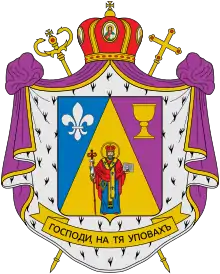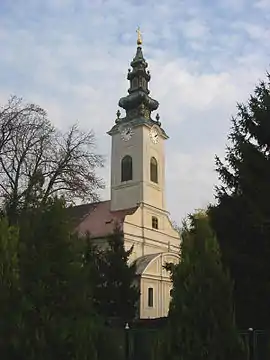Greek Catholic Church of Croatia and Serbia
The Greek Catholic Church of Croatia and Serbia (Latin: Ecclesia Graeco-Catholica Croatiae et Serbiae; Croatian: Grkokatolička crkva u Hrvatskoj i Srbiji; Serbian: Гркокатоличка црква у Хрватској и Србији), sometimes called, in reference to its Byzantine Rite, the Byzantine Catholic Church of Croatia and Serbia, is a particular (sui iuris) Eastern Catholic Church which is in full union with the Catholic Church. It consists of the Greek Catholic Eparchy of Križevci,[1] covering Croatia, Slovenia, Bosnia-Herzegovina, and the Greek Catholic Eparchy of Ruski Krstur,[2] covering Serbia. The Eparchy of Križevci was headed by Bishop Nikola Kekić until his retirement in March 2019, and since then the eparchy is governed by apostolic administrator Milan Stipić.[3] The Eparchy of Ruski Krstur is headed by Bishop Đura Džudžar since his appointment in 2003 (until 2018 as Apostolic Exarch).[4]
| Greek Catholic Church of Croatia and Serbia | |
|---|---|
| Croatian: Grkokatolička crkva u Hrvatskoj i Srbiji Serbian: Гркокатоличка црква у Хрватској и Србији | |
 Coat of arms of the clergy Đura Džudžar, Bishop of the Eparchy of San Nicola di Ruski Krstur (Križevci) | |
| Classification | Eastern Catholic |
| Polity | Episcopal |
| Structure | two eparchies |
| Pope | Francis |
| Bishops | Milan Stipić, Đura Džudžar |
| Region | Bosnia and Herzegovina, Croatia, Serbia, Slovenia |
| Language | Church Slavonic |
| Liturgy | Byzantine Rite |
| Part of a series on |
| Particular churches sui iuris of the Catholic Church |
|---|
| Particular churches are grouped by rite. |
| Alexandrian Rite |
| Armenian Rite |
| Byzantine Rite |
| East Syriac Rite |
| Latin liturgical rites |
| West Syriac Rite |
|
|
Although two eparchies are canonically linked, the Church has no unified structure, nor an ecclesiastical province of its own, since the Eparchy of Križevci is suffragan to the Roman Catholic Archdiocese of Zagreb, and the Eparchy of Ruski Krstur is directly subjected to the Holy See.
History
Until 2001, the Greek Catholic Eparchy of Križevci had full jurisdiction over all Eastern Catholics of the Byzantine Rite throughout the entire territory of former Yugoslavia, including all of its successor states: Croatia, Slovenia, Bosnia and Herzegovina, Serbia, Montenegro and North Macedonia. During that time, it mostly gathered its faithful among the Croats in central and eastern Croatia, among the Pannonian Rusyns or Ukrainians in eastern Croatia, northern Bosnia and northern Serbia and among Macedonians in North Macedonia.
After the formation of independent successor states from what had been Yugoslavia, the process of administrative reorganization was initiated. In 2001, a separate Greek Catholic Apostolic Exarchate of Macedonia was formed for Greek Catholics in North Macedonia. It was fully separated from the Eparchy of Križevci and proclaimed as directly subject only to the Holy See.[5]
In 2003, a new apostolic exarchate was created for Greek Catholics in Serbia and Montenegro, the Apostolic Exarchate of Serbia and Montenegro.[6] Its first exarch Đura Džudžar (Ђура Џуџар) was appointed in 2003, with residence in Ruski Krstur. This exarchate remained in association with the Eparchy of Križevci.
After those changes, the jurisdiction of the Eparchy of Križevci was confined to Croatia, Slovenia, and Bosnia-Herzegovina.
In 2013, all Catholics of Byzantine Rite in Montenegro were entrusted to the local Latin Bishops, so the jurisdiction of Apostolic Exarchate of Serbia and Montenegro was reduced to Serbia only.[7] The Apostolic Exarchate of Serbia was elevated to the Greek Catholic Eparchy of Ruski Krstur in December 2018.[8]
Liturgy and extent
The liturgy is the Slavonic form of Byzantine Rite, using the Old Church Slavonic language and the Cyrillic alphabet.
The Eparchy of Križevci reported for the year 2010 a total of 21,509 faithful (in Croatia, Slovenia, and Bosnia-Herzegovina). At that time, the Apostolic Exarchate for Serbia and Montenegro reported 22,369 faithful.[9]
Gallery

 Cathedral of St. Nicholas in Ruski Krstur, Serbia
Cathedral of St. Nicholas in Ruski Krstur, Serbia
See also
References
- Catholic Hierarchy: Greek Catholic Eparchy of Križevci
- Catholic Hierarchy: Greek Catholic Eparchy of Ruski Krstur
- Križevačka eparhija: Biskup
- Catholic Hierarchy: Bishop Đura Džudžar
- Acta Apostolicae Sedis, 93 (2001), p. 339.
- Catholic Hierarchy: Greek Catholic Apostolic Exarchate of Serbia and Montenegro
- Acta Apostolicae Sedis, 105 (2013), p. 187.
- Catholic Hierarchy: Greek Catholic Eparchy of Ruski Krstur
- The Eastern Catholic Churches 2010
External links
| Wikimedia Commons has media related to Greek Catholic Church of Croatia and Serbia. |
- Eparchy of Križevci (in Croatian)
- Apostolic Exarchate of Macedonia (2001-) on Catholic Hierarchy
- Apostolic Exarchate of Serbia and Montenegro (2003-2013) on Catholic Hierarchy
- Apostolic Exarchate of Serbia (2013-) on Catholic Hierarchy
- Article on Greek Catholics in Former Yugoslavia by Ronald Roberson on the CNEWA web site